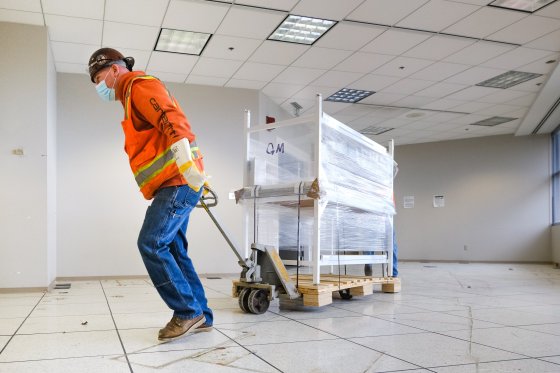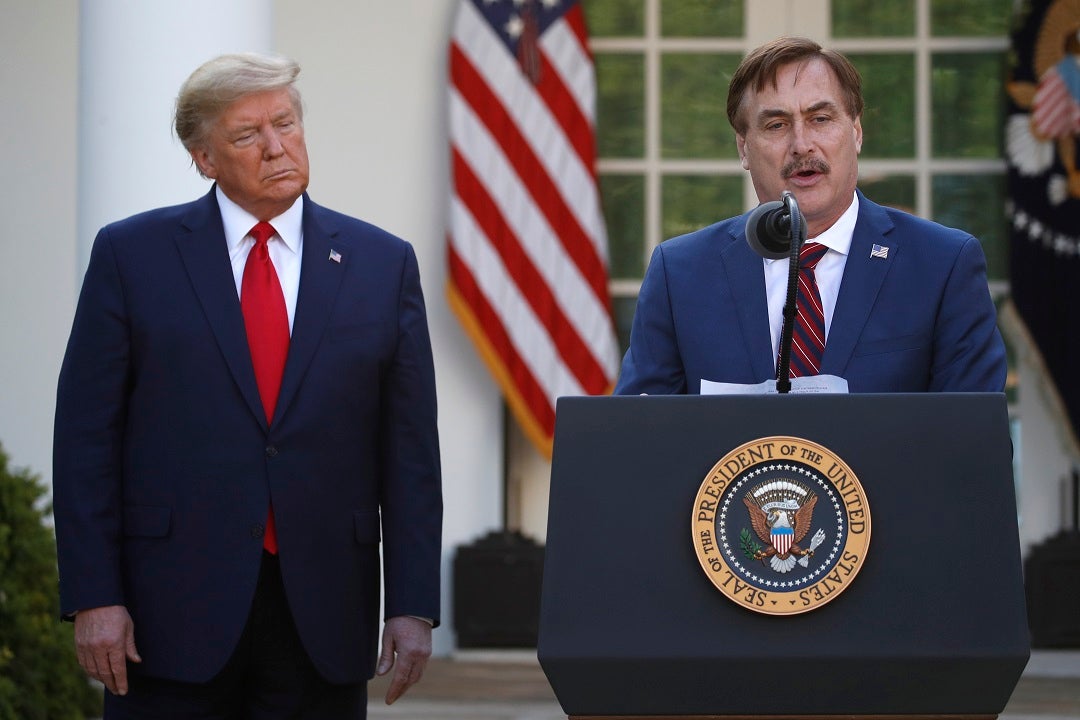New York Times: Hellmut Stern, 91, Dies; Violinist Returned to Germany After Fleeing

By BY KATHARINE Q. SEELYE from NYT Arts https://nyti.ms/2UyAVjc
via The NewYork Times
No. 1 Blog providing Breaking News getting viral all over the world, on the Internet.







from Yahoo News - Latest News & Headlines https://yhoo.it/39vv2Ys
via Yahoo News

from Yahoo News - Latest News & Headlines https://yhoo.it/2wRs4QF
via Yahoo News

from Yahoo News - Latest News & Headlines https://yhoo.it/3bAhkVs
via Yahoo News

from Yahoo News - Latest News & Headlines https://yhoo.it/2JruNTp
via Yahoo News

from Yahoo News - Latest News & Headlines https://yhoo.it/340FPse
via Yahoo News



On Friday, Mar. 27, President Donald Trump took what appeared to be bold, decisive action in the fight against the new coronavirus. Reaching for wartime powers under the Defense Production Act, Trump ordered the federal government to “use any and all authority” to force auto giant General Motors to produce ventilators, the life-saving medical devices desperately needed by patients and hospitals struggling to survive the fast-spreading COVID-19 respiratory illness. For good measure, Trump tweeted, “General Motors MUST immediately open their stupidly abandoned Lordstown plant in Ohio, or some other plant, and START MAKING VENTILATORS, NOW!!!!!!”
But if Trump’s Friday performance conveyed urgency and action, four days later, neither is anywhere in evidence. Despite the tough talk and the invocation of presidential powers, Trump and his team by midday on Tuesday had yet to formally file a single order for a GM-made ventilator. While negotiations were ongoing, they had set no mandatory timeline for delivery of the machines, or even suggested a voluntary one. And they had not informed GM of what prices the federal government will pay for the machines under Trump’s executive order. For its part, GM has continued following the plan to produce ventilators that it had discussed with the White House for weeks prior to Trump’s order, a plan that was already well underway when he issued it, according to documents reviewed by TIME.
The GM episode is just the latest in what has become a common Trump-led scene during the pandemic’s spread. As known U.S. cases skyrocketed from 98 to 177,300 over the last four weeks, Trump has made vocal public shows of action that in several cases have yielded few real results. On Mar. 13, he declared Google was building a website to help people find local coronavirus testing sites. Thus far, it has ended up being little more than a bare-bones, aggregational site with a series of links. That same day, he promised big box retailers—Walgreens, Walmart and CVS—would roll out drive-thru testing sites in their parking lots, a notion that also hasn’t fully materialized.
Sign up for our daily coronavirus newsletter by clicking on this link, and please send any tips, leads, and stories to virus@time.com.
It’s not unusual for a president to use his position to project optimism and progress at times of crisis. FDR famously declared in 1932, during the depths of the Great Depression, that America demanded “bold, persistent experimentation” and that if a first effort failed to “admit it frankly and try another.” Trump aides claim that his efforts are spurring action and setting a positive tone at the top. But Republican and Democratic critics say Trump’s approach appears to be less focused on solving the life and death problems that COVID-19 are imposing on Americans, than on the political challenges the disease is presenting to him.
The GM case in particular brought together several political vulnerabilities for Trump. First, it was taking place in Michigan, a state he barely won in 2016, where Republicans fared poorly in the 2018 mid-terms and where Trump is currently trailing Joe Biden by 3 or more percentage points in several polls. More broadly, Trump’s order came as he was under repeated criticism for not taking more action to help states in desperate need of assistance. “They were getting a lot of pressure,” says Michigan Democratic Rep. Elissa Slotkin, a former Defense Department and CIA official who sponsored bipartisan legislation to require the president to implement the DPA to speed the production and distribution of supplies.
As Trump continues to project action and accomplishment, COVID-19 cases continue to spike and so does the urgency of demand from mayors, governors and leaders around the world for ventilators. The coronavirus pandemic has killed more than 41,650 people across the globe, including more than 3,500 Americans. The sickest of those infected have severe inflammation in their lungs, which stiffens them, and makes it impossible to breathe without help from a ventilator. Some of these victims need the device for weeks at a time. Hospital staff say they are concerned about shortages of specialized equipment. If the system swells over capacity, doctors and nurses worry they may ultimately have to ration health care and decide who lives and who dies. Trump’s medical advisors said Monday that even if everything goes perfectly the number of deaths in America could hit 240,000.
Some at GM say it is unfair for the President to make them the bad guys. “It felt like we were getting punched in the gut,” says a long-time GM employee, who wasn’t authorized to speak publicly on the matter. “We did everything in our power to transition from building Tahoes to building ventilators without any guarantee of a federal contract.”
In any case, the company’s officials say, they’re not waiting for direction from the federal government or anyone else. GM forged a deal with Seattle-area ventilator manufacturer Ventec Life Systems and already has begun retooling a factory to build thousands of them beginning next month. “We’re not waiting around for anyone to dictate what number of ventilators need to be made,” says Chris Brooks, Ventec’s chief strategy officer. “Our north star has always been to make as many ventilators as possible, as quickly as possible, to arm front-line medical professionals with the tools they need to save lives.”

GM’s strategy to build ventilators began as the company was facing its own coronavirus crisis. Like other companies around the country, it was projecting dramatic contraction in demand for its cars as unemployment spiked and spending plummeted nationwide. At the same time, it needed to temporarily close plants to prevent the spread of the virus. On March 17, ten days before Trump’s big announcement, and the day before GM announced it would shutter all of its North American factories due to coronavirus, GM CEO Mary Barra called White House economic adviser Larry Kudlow to discuss converting factory space for ventilator production.
Kudlow and the White House turned to a newly formed organization of business leaders, called StopTheSpread.org, for help. The group is led by the former American Express CEO Kenneth Chenault and Rachel Carlson, founder of the online education firm Guild Education, who volunteered to help the Trump Administration in harnessing private industry. In exploratory phone calls with GM, the group discovered what the automaker needed was a medical device-making partner with a reputable product.
StopTheSpread.org matched them up with Ventec, maker of a toaster-sized device known by its acronym, VOCSN (for ventilator, oxygen, cough, suction and nebulizer). On Mar. 18, the two companies held initial phone calls to discuss what could be done. The next day, GM chartered a late-night flight and four engineers, including Phil Kienle, manufacturing chief for North America, flew from Detroit to Seattle for face-to-face talks.
The GM team spent the next three days at Ventec’s headquarters in Bothell, Wash. examining machines that breathe life into immobilized people who can’t do it on their own. They pored over blueprints illustrating where each of the device’s 700 parts come together largely by hand. Images of the parts were handed to a GM purchasing agent see if suppliers could replicate the handiwork. “We sourced literally hundreds of parts and components in just over a week, which is lighting speed, and we will begin production by mid-April,” says Gerald Johnson, GM executive vice president of global manufacturing. “From there, production will scale up to 10,000 or more per month very quickly.”
Next up were workers. GM called 1,000 workers to see if they were willing to come to work for the company on ventilators. Greg Wohlford, chairman of United Auto Workers Local 292, which represents the shuttered GM plant in Kokomo, Ind., told the Kokomo Tribune he was just waiting to hear about the training details. “It’s going to happen, we’re just trying to work out all the details,” he said. “But everybody is thrilled. Everyone is really excited.” New manufacturing space was located in a 2.6 million square foot facility with clean rooms where small electronic components for cars are manufactured. Construction workers began tearing up carpet and knocking down walls to make way for additional workstations. Cameras were installed to document the progress.
All told, it took less than a week for GM to forge a partnership with Ventec, according to internal communications, travel logs and interviews with both companies’ officials. The companies produced a full set of manufacturing plans that leveraged union labor, industrial buying power and a worldwide chain of 700 suppliers. Ultimately, the companies claimed they would be able to produce up to 21,000 ventilators a month, if needed.
On Mar. 23, GM and Ventec presented the Federal Emergency Management Agency with the strategy. The companies provided the administration with an itemized list that laid out how many ventilators could be produced, how quickly and at what cost, depending on the options the federal government selected, according to two officials involved in the contracting process.
And then they waited to hear back.
Four days later, they got their response. First, at 11:16 a.m. on March 27, Trump issued a series of tweets blasting GM and Barra. Then, later, at the White House, he elaborated. “We don’t want prices to be double, triple what they should be,” he told reporters. “So General Motors, we’ll see what happens, but now they’re talking. But they weren’t talking the right way at the beginning, and that was not right to the country.” GM pushed back in a public statement that said the company’s commitment to the Ventec ventilator project “has never wavered” and that “GM is contributing its resources at cost.” Officials insisted nothing had changed in their schedule.
As usual with “this” General Motors, things just never seem to work out. They said they were going to give us 40,000 much needed Ventilators, “very quickly”. Now they are saying it will only be 6000, in late April, and they want top dollar. Always a mess with Mary B. Invoke “P”.
— Donald J. Trump (@realDonaldTrump) March 27, 2020
In the days leading up to Trump’s comments, governors and lawmakers from the hardest-hit states pleaded with him to use the DPA, a little-known Cold War-era law that enables the president to force businesses to accept and prioritize government contracts during natural disasters, terrorist attacks and other emergencies. Dwindling supplies of respirator masks, gowns, gloves and other basic protective equipment are pushing the nation’s front-line medical workers toward a breaking point.
Politicians from both parties were convinced that using the statute could prevent counterproductive bidding wars that were breaking out across the country, as states competed with each other to acquire the same medical supplies from suppliers. New York Governor Andrew Cuomo said ventilators on the market now cost more than $50,000, which represents a 150% increase from the $20,000 when his state first tried to purchase them.
Trump has insisted that invoking the DPA was government overreach and that companies were stepping up on their own. But perceptions of a weak federal response to the growing crisis is seen as a political liability to Trump in key election states, including Ohio and Michigan. When on Mar. 26, for example, Michigan Governor Gretchen Whitmer, a Democrat, publicly said her state wasn’t getting the medical equipment it needed, Trump responded on Twitter that she was “way in over her head” and that she “doesn’t have a clue.”
The administration says Trump’s Mar. 27 flare-up had nothing to do with politics. By invoking the DPA, the president compelled GM to “to accept, perform, and prioritize contracts or orders for the number of ventilators,” according the executive order. Peter Navarro, Trump’s Trade Adviser and Policy Coordinator for the DPA, told TIME in a statement that the GM action aimed to jumpstart work on ventilators. “Prior to the DPA order being signed, the GM/Ventec venture was sputtering. Since the DPA order was signed, GM has moved into high gear. That’s the poster child of an effective DPA action,” Navarro said.
Navarro also says the President’s declaration was designed to spur competition between different automakers turning to produce ventilators. Ford is working with GE Healthcare to increase GE’s production of its own advanced ventilators, although manufacturing details remain unclear. Ford announced Monday it plans to make as many as 50,000 smaller ventilators, which are licensed by GE, within 100 days at a plant in Ypsilanti, Mich. Now that GM has been pushed publicly by Trump, Navarro suggests, there will be urgency to sprint to the market first. “Now let’s see which venture rolls the first hundred ventilators off their new assembly lines—Ford/GE or GM/Ventec. We expect that within the next 30 days, American lives are at stake, and GM’s lesson from this should be you can’t get to the finish line until you first get to the starting line. Now, a very real race is on.”
Whatever the logic behind Trump’s public statements about GM and his use of emergency powers, the company maintains that Trump’s tough talk resulted in no change from the Mar. 23 plan they presented to his government. Two days after his Mar. 27 statements, on Sunday, Trump was asked at the White House how negotiations GM were going since he invoked DPA two days earlier. Although nothing had changed, he responded that the automaker was now doing a “fantastic job.”


from Yahoo News - Latest News & Headlines https://ift.tt/3dKG8fA
via Yahoo News

from Yahoo News - Latest News & Headlines https://ift.tt/3axgVmu
via Yahoo News

from Yahoo News - Latest News & Headlines https://ift.tt/2QUBgKI
via Yahoo News











from Yahoo News - Latest News & Headlines https://ift.tt/3bBhtrP
via Yahoo News

from Yahoo News - Latest News & Headlines https://ift.tt/3arLmKN
via Yahoo News

